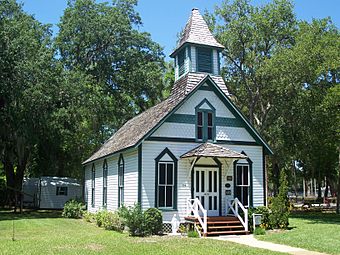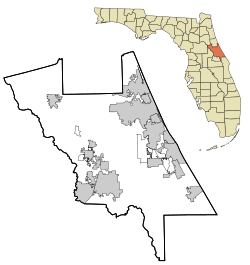St. Rita's Colored Catholic Mission facts for kids
Quick facts for kids |
|
|
St. Rita's Colored Catholic Mission
|
|
 |
|
| Location | 314 Duss St., New Smyrna Beach, Florida |
|---|---|
| Area | less than one acre |
| Built | 1899 |
| Architectural style | Late Gothic Revival |
| NRHP reference No. | 07000280 |
| Added to NRHP | April 13, 2007 |
The St. Rita's Colored Catholic Mission is a very old and important building. It is located in New Smyrna Beach, Florida, in the United States. This building has a rich history. It was first built in 1899. At that time, it was known as Sacred Heart Catholic Church. It stood on Faulkner Street.
Later, in 1956, the building was moved. It found a new home at 314 Duss Street. Here, it became a Catholic Mission. This mission served the African-American community. Today, this historic building has a new purpose. It is now called the Mary S. Harrell Black Heritage Museum. On April 13, 2007, the building received special recognition. It was added to the U.S. National Register of Historic Places. This means it is a place of national importance.
A Building's Journey
This historic building has moved once. It started as Sacred Heart Catholic Church. That was in 1899. It was on Faulkner Street in New Smyrna Beach. In 1956, the church building was moved. It traveled to 314 Duss Street.
Serving the Community
After its move, the building became a mission. It was known as St. Rita's Colored Catholic Mission. A mission is a place that helps people. This mission served the African-American community. It was a place for worship and community gatherings.
From Mission to Museum
Over time, the building's role changed. It stopped being a mission. Now, it is a museum. It is called the Mary S. Harrell Black Heritage Museum. This museum helps people learn about history. It shares the stories and culture of the African-American community.
National Recognition
On April 13, 2007, the building received a special honor. It was added to the National Register of Historic Places. This is a list of important places in the United States. Being on this list means the building is protected. It is recognized for its historical value. This helps make sure it will be preserved for future generations.
 | Victor J. Glover |
 | Yvonne Cagle |
 | Jeanette Epps |
 | Bernard A. Harris Jr. |


